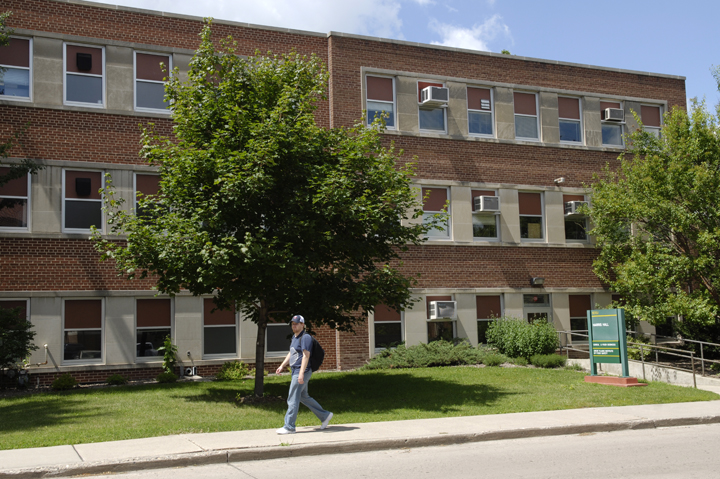Food science deals with the transformation of raw agricultural goods into food products acceptable for human consumption. This field of applied science involves studying diverse scientific disciplines such as chemistry, engineering, microbiology, biochemistry, toxicology and management as they relate to food, and effectively applying the industrial and practical aspects to product development, food processing, preservation and marketing.
The Faculty and Facilities
Food science is a four-year curriculum offered by the College of Agriculture, Food Systems, and Natural Resources through the Department of Plant Sciences. The program draws on the expertise of faculty members in several departments at North Dakota State University who have expertise in both teaching and research. Many have industry experience with numerous connections in the food industry.
The Quentin Burdick Building (QBB) and Harris Hall at NDSU house laboratories and teaching facilities where many of the food science courses are taught. Extensive facilities are available for teaching and food processing research.
The Curriculum
The program includes courses in food chemistry, food analysis, food microbiology, food fermentation, food processing, food engineering, meat science, nutrition science and cereal technology, in addition to basic courses in mathematics, the sciences, humanities and social sciences. Most of the applied courses in food science are taken after the basic courses have laid the groundwork for the student.
The program allows flexibility in selecting suitable electives to direct one’s career goal. Areas of emphasis include food safety, microbiology, sciences, business and management, engineering, nutrition and processing.
The curriculum for food science is approved by the Institute of Food Technologists (IFT). The four-year undergraduate program leads to a Bachelor of Science degree in food science. The program enables graduates to recognize, critically analyze and solve problems realistically in both industrial and academic environments. It provides the opportunity to gain industrial experience during undergraduate study by means of industry internships.
A great way to continue higher education for students currently enrolled in Food Science at North Dakota State University is to consider the Accelerated Master of Science in Cereal Science program, where fifteen of the didactic credits (600/700 level) can be used to meet the requirement for the B.S. degree. Please, see the Cereal Science Accelerated M.S. page for more details. There are additional opportunities for students majoring in other disciplines to learn more about Food Science - students can opt for minor in Food Science and Technology.
Career Opportunities
Challenging and rewarding entry-level positions in the food industry are plentiful for food science graduates. Potential employers include large and small food corporations and government agencies. Career opportunities include positions in food science and technology, food chemistry, food microbiology, product development, quality control, food production and processing, food inspection, packaging, sales and marketing. The median salary for a food professional in US is $110,000 and an individual with a B.S. degree in food science is $98,163 according to the Institute of Food Technologists’ 2022 Salary Survey.
Food scientists study food to improve existing products or create new ones. They also analyze the structure and composition of food and the changes that occur during processing and storage. They determine how processing affects flavor, texture, appearance and nutritional value, and explore new ways to protect and stabilize food through packaging.
The food industry is the largest industry in the world. The challenges of food scientists are to provide wholesome, tasty and nutritious foods for the consumer.
Industry Internships
Internships offered through NDSU's food science department and Cooperative Education programs provide opportunities for industry experience at companies such as Ardent Mills, Cargill, 8th Avenue Pasta, Hormel, Jennie-O, SunOpta, and others.
Financial Aid and Scholarships
Loans, scholarships, grants and work-study are made available through the Office of Financial Aid and Scholarships. A number of scholarships are awarded each year to students enrolled in the College of Agriculture, Food Systems, and Natural Resources. Please see: CAFSNR scholarships for more information. Departmental (Food Science program) scholarships also are available. Information may be obtained by contacting the coordinator of the food science program. A number of laboratory assistant jobs are available for students majoring in food science.
Sample Program Guide
IMPORTANT DISCLAIMER: A Sample Program Guide provides an unofficial guide of program requirements and should be used by prospective students who are considering attending NDSU in the future. It is NOT an official curriculum and should NOT be used by current NDSU students for official degree planning purposes. Note that the official curriculum used by current NDSU students can vary from the Sample Program Guide due to a variety of factors such as, but not limited to, start year, education goals, transfer credit, and course availability.
To ensure proper program completion, enrolled students should utilize Degree Map and Schedule Planner in Campus Connection and consult regularly with their academic advisor to ensure requirements are being met.

